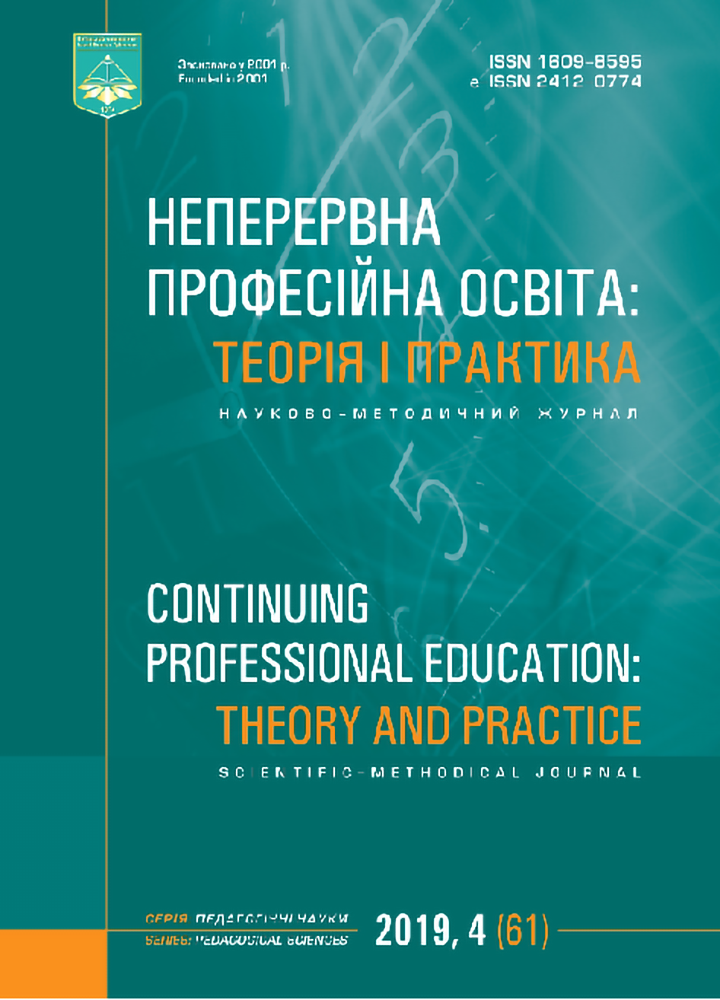FORMATION OF EMOTIONAL INTELLIGENCE OF FUTURE MUSICAL ART TEACHERS: RESULTS OF AN ASCERTAINING EXPERIMENT
DOI:
https://doi.org/10.28925/1609-8595.2019.4.4246Keywords:
ascertaining experiment, emotional intelligence, professional training, teacher of music artAbstract
The article is devoted to the issue of formation of emotional intelligence by future teachers of music art in the process of professional training and analysis of its modern state in the context of strategic tasks of modernization of higher pedagogical education and prospects for its further improvement. The purpose, tasks and diagnostic methods of the ascertainment experiment with the participation of first-year (bachelor), second (master), full-time and part-time students, professors and music teachers were shown. It is noted that the analysis of normative documents of higher educational institutions of Ukraine, which carry out training of specialists with major in «Music Arts», testified the lack of special educational disciplines aimed at forming the emotional intelligence of a future teacher. At the same time, such disciplines are envisaged in the curricula for training specialists of socio-economic professions. Specially designed blocks of questionnaire allowed to examine the opinion of the respondents regarding the awareness of the concept of «emotional intelligence», understanding of its essence, characteristic features, their presence in the interviewed and expediency of its formation as an integral, individual-personal and professionally significant quality of a modern teacher. The results of the study in figures show that the majority of respondents are unfamiliar with the concept of «emotional intelligence», although most respondents gave a positive answer to the question of the appropriateness of mastering the components of this complex psychic education. As a result of the ascertainment experiment, it was concluded that the current professional training of future teachers of music art does not fully meet the requirements of building a new Ukrainian school. It needs the development of the concept of formation of emotional intelligence of future teachers of music art, substantiation of its theoretical and methodological foundations, development and implementation of innovative approaches in the content and organization of their professional and professional training.References
Andreyeva, I. N. (2011). Emotsionalnyi intellekt kak fenomen sovremennoi psikhologii [Emotional Intelligence as a Phenomenon of the Modern Psychology]. Novopolotsk, Belarus: Polotsk State University (rus).
Goleman, D. (2009). Emotsionalnyi intelekt [Emotional intelligence]. Moscow, Russia: ACT (rus).
Kolisnyk, L. O. (2017). Emotsiynyi intelekt yak resurs [Work program of the discipline «Emotional intelligence as a resource»]. Sumy, Ukraine: Sumy State University. Retrieved from http://ppst.sumdu.edu.ua/images/Emoc_ intelekt_Kolisnuk_DZV.pdf (ukr).
Nosenko, E. L. (2014). Teoriya emotsiynogo intelektu [Work program on elective discipline «Theory of emotional intelligence» for students in the field of preparation 6.030102 «Psychology»]. Dnipropetrovsk, Ukraine: Oles Honchar Dnipro National University. Retrieved from http://distance.dnu.dp.ua/ukr/nmmateriali/documents/ tei.pdf (ukr).
Rakityanska, L. (2018). Stanovlennya ta rozvytok poniattya « emotsiynyi intelekt»: istoryko-filosofskyi analiz [Formation and development of the concept of «emotional intelligence»: historical and philosophical analysis]. Continuing Professional Education: Theory and Practice, 3–4 (56–57), 36–42. DOI: 10.28925/1609-8595.2018.3-4.3642 (ukr).
Shevyakov, O. V. (2017). Psykhologiya emotsiynogo intelektu ta liderstva [Work program of the course «Psychology of emotional intelligence and leadership» for students of major 053 «Psychology»]. Dnipro, Ukraine: Dnipro Humanities University, Retrieved from http://dgu.com.ua/metod/053m/peil/2.pdf (ukr).
Bar-On, R. (1997). Emotional Intelligence Inventory (EQ-I): Technical Manual. Toronto, Canada: MultiHealth System (eng).
Bar-On, R., Parker, J. (2000). Emotional and social intelligence: Insights from the Emotional Quotient Inventory. In Handbook of emotional intelligence (pp. 363–388). San Francisco, USA: Jossev-Bass (eng).
Gardner, H. (1983). Frames of mind. New York: Basic Books (eng). Gardner, H. (1993). Multiple intelligences: the theory in practice. N.Y.: Basic Books (eng).
Mayer, J. D., Salovey P. (1993). The Intelligence of Emotional Intelligence. Intelligence, 17, 4, 433–442 р. (eng).
Downloads
Published
How to Cite
Issue
Section
License
Copyright (c) 2020 Lyudmila Rakityanska

This work is licensed under a Creative Commons Attribution-NonCommercial 3.0 Unported License.



